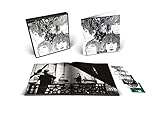
Bob Seger recently joined Bruce Springsteen and the E Street Band on stage in Detroit during Springsteen’s current The River tour, which is promoting the release of The Ties That Bind: The River Collection. After playing some joyous tambourine on “10th Avenue Freeze-Out,” Seger also joined in on a performance of The Isley Brothers’ “Shout.” Although Seger-Springsteen collaborations are rare, it was not the first time Seger and Springsteen have performed together.
Seger had first performed with Springsteen during the opening night of the original The River tour back in 1980, when Seger helped out on “Thunder Road.” Below is the audio of that performance.
Although Rolling Stone reports that the two are good friends, after the 1980 concert Seger and Springsteen did not appear onstage together until December 2011 when Springsteen joined Seger’s concert for Seger’s “Old Time Rock and Roll.” Check it out.
That brings us to the most recent collaboration on April 14, 2016. From the energy of the performance this week, it was worth the four-and-a-half-year wait to see the two together on “Tenth Avenue Freeze-Out” and “Shout.” Hopefully we will see them together again soon.
Although Bob Seger’s Ride Out Tour with the Silver Bullet Band ended in March 2015, Springsteen still has work to do. The current U.S. leg of The River tour ends April 25 in Brooklyn before heading overseas to Europe for the summer.
What song would you like Seger and Springsteen to do together? Leave your two cents in the comments.
(Some related Chimesfreedom posts.)
 Like most people, I loved Train’s song “Drops of Jupiter” when it came out in 2001. I ran out and bought the CD of the same name, playing the CD over and over again, but especially repeating the title track. And then, like most people, I got a little tired of hearing it played everywhere.
Like most people, I loved Train’s song “Drops of Jupiter” when it came out in 2001. I ran out and bought the CD of the same name, playing the CD over and over again, but especially repeating the title track. And then, like most people, I got a little tired of hearing it played everywhere.
 Sturgill Simpson’s upcoming album A Sailor’s Guide To Earth has been receiving
Sturgill Simpson’s upcoming album A Sailor’s Guide To Earth has been receiving 
